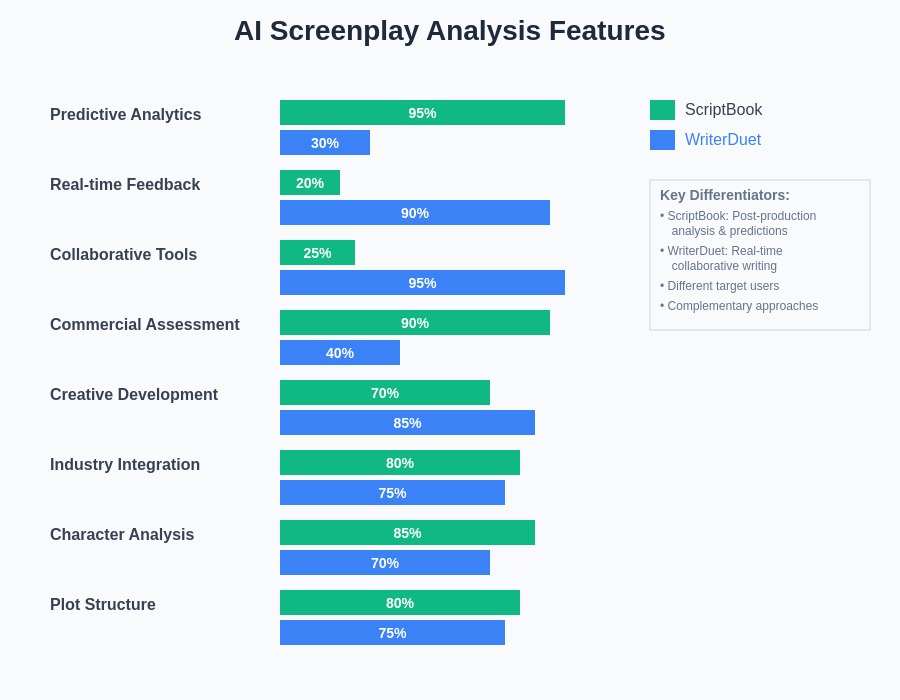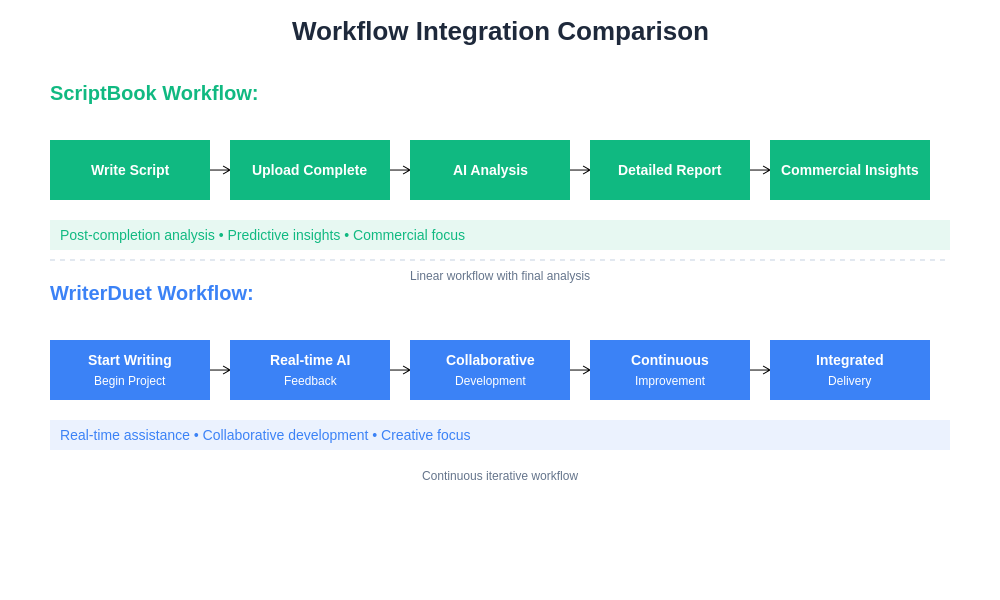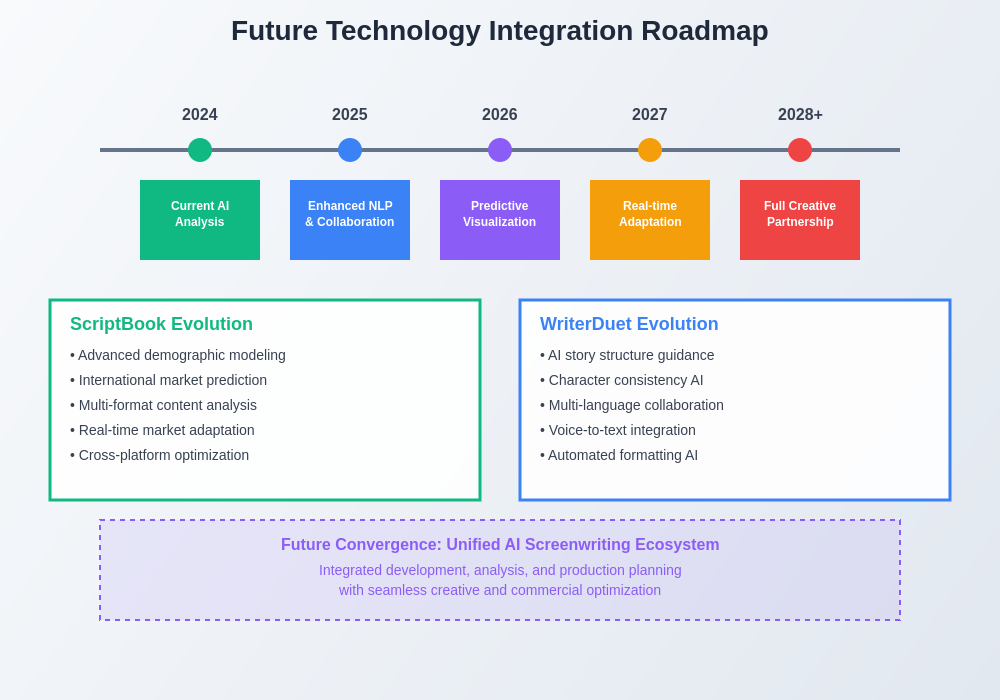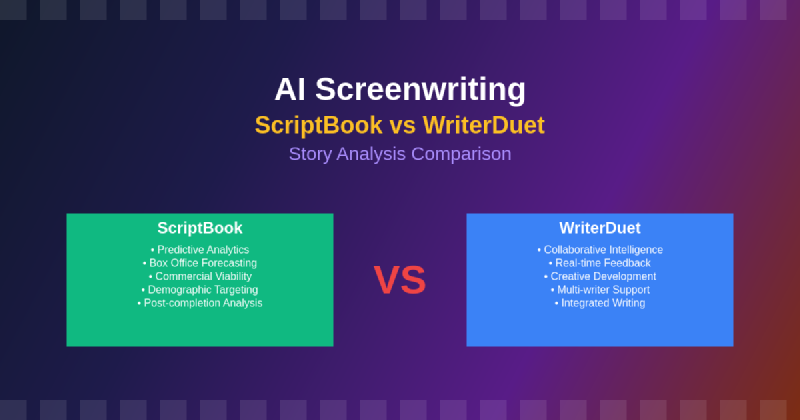The entertainment industry has embraced artificial intelligence as a transformative force in creative processes, with screenwriting representing one of the most fascinating applications of machine learning and natural language processing technologies. Among the pioneering platforms that have revolutionized how writers, producers, and studios approach script development and story analysis, ScriptBook and WriterDuet stand out as industry leaders, each offering unique AI-powered capabilities that promise to enhance creative decision-making and streamline the traditionally subjective process of evaluating screenplay potential.
Discover the latest AI trends in creative industries to understand how artificial intelligence is reshaping storytelling across film, television, and digital media platforms. The integration of sophisticated algorithms into the creative process represents a paradigm shift that challenges conventional wisdom about artistic intuition while providing data-driven insights that can complement human creativity and industry expertise.
Understanding AI-Powered Screenplay Analysis
The application of artificial intelligence to screenplay analysis represents a convergence of computational linguistics, machine learning algorithms, and decades of accumulated knowledge about narrative structure, character development, and audience engagement patterns. These sophisticated systems analyze scripts through multiple dimensions, examining everything from dialogue patterns and character arc progression to thematic consistency and commercial viability indicators that have historically relied on subjective human judgment and industry experience.
Modern AI screenwriting tools utilize natural language processing to deconstruct scripts into analyzable components, applying pattern recognition algorithms trained on vast databases of successful and unsuccessful films to identify characteristics that correlate with commercial success, critical acclaim, and audience satisfaction. This technological approach transforms the traditionally intuitive process of script evaluation into a more systematic and potentially predictable methodology that can supplement human creativity with objective analytical insights.
The sophistication of these systems extends beyond simple text analysis to encompass complex narrative elements such as pacing, tension curves, character relationship dynamics, and genre-specific expectations that influence audience reception and commercial performance. By quantifying previously subjective creative elements, these platforms provide writers and producers with unprecedented visibility into the structural and thematic components that contribute to successful storytelling in contemporary media landscapes.
ScriptBook: Comprehensive Predictive Analytics
ScriptBook has established itself as a pioneer in AI-driven screenplay analysis by developing sophisticated predictive models that claim to forecast box office performance, critical reception, and audience demographics with remarkable accuracy. The platform’s approach centers on comprehensive script analysis that examines thousands of narrative variables, character development patterns, and structural elements to generate detailed reports about a screenplay’s commercial and artistic potential.
The system’s analytical framework encompasses multiple layers of evaluation, including character personality profiling, dialogue authenticity assessment, plot structure optimization, and thematic coherence analysis that provides writers and producers with actionable insights for script development and revision. ScriptBook’s algorithms have been trained on extensive databases of produced films, enabling the system to identify patterns that correlate with successful outcomes across different genres, budget levels, and target demographics.
One of ScriptBook’s most compelling features is its ability to provide demographic targeting insights, analyzing how different audience segments are likely to respond to specific narrative elements, character types, and thematic approaches. This capability proves invaluable for producers and distributors seeking to optimize their marketing strategies and identify the most promising target audiences for their projects, transforming traditional gut-instinct decision-making into data-driven strategic planning.

The platform’s predictive capabilities extend to financial forecasting, offering estimates of potential box office performance based on script characteristics, genre conventions, and market conditions that enable producers to make more informed investment decisions. This financial analysis component has attracted significant attention from studios and independent producers seeking to minimize risk and maximize return on investment in an increasingly competitive entertainment marketplace.
WriterDuet: Collaborative Intelligence Platform
WriterDuet approaches AI-powered screenwriting from a fundamentally different perspective, emphasizing collaborative writing experiences enhanced by intelligent automation and real-time analytical feedback. Rather than focusing primarily on predictive analytics and commercial forecasting, WriterDuet integrates AI capabilities directly into the writing process, providing writers with immediate insights, suggestions, and structural guidance that enhance creativity and productivity during script development.
The platform’s AI-driven features include intelligent formatting assistance, character consistency monitoring, dialogue optimization suggestions, and plot hole detection that help writers maintain narrative coherence and professional standards throughout the creative process. These real-time analytical capabilities transform WriterDuet from a simple writing tool into an intelligent creative companion that actively contributes to story development and script refinement.
Experience advanced AI writing assistance with Claude for complex creative projects that require sophisticated language understanding and generation capabilities. WriterDuet’s integration of collaborative features with AI analysis creates a unique environment where multiple writers can work simultaneously while receiving consistent analytical feedback and creative suggestions that maintain story unity and character development across different contributors.
The platform’s collaborative intelligence extends beyond individual writing sessions to encompass project management capabilities that track revision history, analyze contributor patterns, and provide insights into collaborative dynamics that affect creative outcomes. This comprehensive approach to collaborative screenwriting addresses the complex challenges of multi-writer projects while maintaining the creative integrity and narrative consistency that successful screenplays require.
Analytical Depth and Methodology Comparison
The fundamental differences between ScriptBook and WriterDuet become most apparent when examining their respective analytical methodologies and the depth of insights they provide to users. ScriptBook’s approach emphasizes comprehensive post-completion analysis that treats the screenplay as a finished product ready for evaluation against established success patterns and market conditions. This methodology proves particularly valuable for producers and executives seeking to assess the commercial viability of completed scripts and make informed decisions about development, production, and distribution strategies.
WriterDuet’s analytical framework operates from a fundamentally different philosophical foundation, treating the screenplay as a living document that benefits from continuous analytical feedback and collaborative enhancement throughout the creative process. The platform’s AI capabilities focus on supporting active writing sessions rather than evaluating finished products, providing real-time insights that guide creative decisions and help writers optimize their narratives as they develop.
The distinction between these approaches reflects broader philosophical differences about the role of AI in creative processes. ScriptBook’s methodology aligns with traditional industry practices where scripts undergo evaluation at specific milestones, while WriterDuet’s approach represents a more integrated model where AI becomes an active participant in the creative process rather than merely an evaluation tool applied after completion.
These methodological differences significantly impact the types of insights and recommendations each platform provides, with ScriptBook offering comprehensive predictive assessments and WriterDuet delivering process-oriented guidance that influences creative decisions in real-time. Understanding these distinctions proves crucial for writers and producers seeking to select the most appropriate analytical tools for their specific project requirements and creative workflows.
Commercial Viability Assessment Capabilities
The evaluation of commercial viability represents one of the most critical applications of AI-powered screenplay analysis, as studios and independent producers increasingly seek data-driven approaches to minimize financial risk and optimize investment decisions. ScriptBook’s commercial assessment capabilities have gained significant recognition within the industry for their sophisticated approach to predicting box office performance, audience demographics, and market positioning strategies based on script characteristics and narrative patterns.
ScriptBook’s commercial analysis encompasses multiple factors that influence box office success, including genre conventions, character appeal, plot structure optimization, and thematic resonance with contemporary audience preferences. The system’s algorithms analyze these elements against historical performance data to generate specific predictions about revenue potential, target audience demographics, and optimal release strategies that can inform critical business decisions throughout the production and distribution process.
The platform’s commercial insights extend beyond simple revenue predictions to include detailed analyses of international market potential, streaming platform appeal, and merchandising opportunities that reflect the increasingly complex landscape of contemporary film distribution. These comprehensive assessments prove invaluable for producers navigating the challenging process of securing financing, distribution partnerships, and marketing support for their projects.
WriterDuet’s approach to commercial assessment focuses more on ensuring that scripts meet industry standards and genre expectations rather than providing specific financial predictions. The platform’s analytical capabilities help writers identify and address potential commercial weaknesses during the development process, such as pacing issues, character development problems, or structural inconsistencies that could impact audience engagement and commercial performance.
Creative Development and Enhancement Features
The creative development capabilities offered by each platform reveal significant differences in their approaches to supporting the artistic aspects of screenwriting while maintaining commercial awareness and industry standards. ScriptBook’s creative analysis focuses on identifying narrative strengths and weaknesses that correlate with successful storytelling patterns, providing writers with detailed feedback about character development, plot structure, dialogue effectiveness, and thematic coherence that can guide revision efforts.
The platform’s creative insights are derived from extensive analysis of successful films across multiple genres, enabling the system to identify specific narrative techniques, character archetypes, and structural approaches that resonate with audiences and critics. These insights provide writers with objective feedback about their creative choices while maintaining respect for individual artistic vision and creative expression.
ScriptBook’s character analysis capabilities examine personality consistency, development arcs, and relationship dynamics to identify potential improvements that could enhance audience engagement and emotional investment. The system’s dialogue analysis evaluates authenticity, distinctiveness, and effectiveness in advancing plot and character development, providing specific suggestions for enhancement that maintain the writer’s unique voice while optimizing commercial appeal.
Enhance your creative projects with Perplexity’s research capabilities to gather comprehensive background information and industry insights that inform creative decision-making and story development processes. WriterDuet’s creative development features integrate seamlessly into the writing process, providing real-time feedback and suggestions that help writers maintain narrative consistency and optimize their storytelling techniques as they work.
Integration Workflows and User Experience
The user experience and integration workflows offered by ScriptBook and WriterDuet reflect their different philosophical approaches to AI-assisted screenwriting and reveal important considerations for writers and producers evaluating these platforms. ScriptBook’s workflow centers around uploading completed or near-completed scripts for comprehensive analysis, with results delivered through detailed reports that provide extensive insights and recommendations for improvement or commercial optimization.
The platform’s analytical reports are designed for multiple stakeholder types, including writers seeking creative feedback, producers evaluating commercial potential, and executives making development decisions. This multi-audience approach requires sophisticated presentation of complex analytical data in formats that serve different professional needs while maintaining accessibility and actionable insights for users with varying levels of technical expertise.
ScriptBook’s integration capabilities extend to various screenplay formats and industry-standard software applications, enabling seamless incorporation into existing development workflows without requiring significant changes to established creative processes. The platform’s reporting features can be customized to emphasize specific analytical dimensions based on user requirements, whether focusing on creative development, commercial assessment, or demographic targeting strategies.
WriterDuet’s integration approach emphasizes seamless incorporation into active writing sessions, providing continuous analytical feedback that becomes part of the creative process rather than a separate evaluation phase. The platform’s user interface integrates AI insights directly into the writing environment, enabling writers to access analytical feedback and creative suggestions without interrupting their creative flow or requiring context switching between different applications.

The collaborative features that distinguish WriterDuet create unique integration opportunities for multi-writer projects, enabling teams to benefit from consistent AI analysis while maintaining individual creative contributions and collaborative dynamics. This approach proves particularly valuable for television writing rooms, collaborative feature film development, and other multi-writer scenarios where maintaining narrative consistency across different contributors presents significant challenges.
Data Privacy and Intellectual Property Considerations
The integration of AI-powered analysis into screenplay development raises important questions about data privacy, intellectual property protection, and creative ownership that writers and producers must carefully consider when evaluating these platforms. Both ScriptBook and WriterDuet have developed comprehensive policies and technical safeguards to protect user content while enabling the analytical capabilities that define their value propositions.
ScriptBook’s approach to data privacy emphasizes secure handling of uploaded scripts with strict confidentiality protocols that protect intellectual property throughout the analysis process. The platform’s technical infrastructure includes encryption, access controls, and data retention policies designed to ensure that proprietary content remains protected while enabling comprehensive analytical processing that requires access to script details and narrative structures.
The platform’s intellectual property protections extend to analytical results and insights, with clear policies defining ownership of generated reports and recommendations while maintaining writer and producer rights to their original creative content. These protections prove particularly important for high-profile projects and valuable intellectual properties where unauthorized disclosure could result in significant financial and competitive disadvantages.
WriterDuet’s collaborative focus creates additional complexity around data privacy and intellectual property protection, as the platform must safeguard content across multiple contributors while enabling real-time collaboration and AI analysis. The platform’s technical architecture includes sophisticated permission controls, revision tracking, and access logging that provide transparency and security for collaborative projects involving multiple stakeholders with different levels of authorization.
Cost-Benefit Analysis for Different User Types
The financial considerations associated with adopting AI-powered screenplay analysis tools vary significantly depending on user type, project scope, and intended applications, making cost-benefit analysis an essential component of platform selection decisions. ScriptBook’s pricing structure reflects its focus on comprehensive analytical reports and commercial assessment capabilities, with subscription tiers designed to serve different user categories from individual writers to major studios with extensive development pipelines.
For independent writers and small production companies, ScriptBook’s analytical capabilities can provide valuable insights that might otherwise require expensive consultant fees or extensive market research, potentially justifying the subscription costs through improved script quality and more informed development decisions. The platform’s predictive capabilities may prove particularly valuable for projects seeking financing or distribution partnerships, as data-driven assessments can enhance pitch presentations and investor confidence.
Larger production companies and studios may find ScriptBook’s comprehensive analytical capabilities cost-effective compared to traditional script coverage services and market research expenses, particularly when evaluating multiple projects simultaneously or conducting competitive analysis of industry trends and successful narrative patterns. The platform’s demographic insights and commercial predictions can inform strategic decisions about project prioritization, marketing approaches, and distribution strategies that impact overall profitability.
WriterDuet’s cost structure emphasizes accessibility and collaborative value, with pricing models designed to accommodate individual writers, small teams, and larger collaborative projects without creating prohibitive barriers to adoption. The platform’s integrated approach to AI-assisted writing may provide cost advantages by reducing revision cycles, improving script quality, and enhancing collaborative efficiency that translates into time savings and improved creative outcomes.
Industry Adoption and Professional Recognition
The entertainment industry’s adoption of AI-powered screenplay analysis tools reflects broader trends toward data-driven decision-making and technological enhancement of creative processes, with both ScriptBook and WriterDuet gaining recognition from different segments of the professional screenwriting and production communities. Industry adoption patterns reveal important insights about the practical value and limitations of these platforms in real-world creative and commercial environments.
ScriptBook has gained particular recognition within the production and financing segments of the entertainment industry, where its predictive capabilities and commercial assessments align with the data-driven approaches increasingly favored by studios, distributors, and investors evaluating project potential. The platform’s analytical reports have been cited in industry publications and conference presentations as examples of how artificial intelligence can enhance traditional development processes while maintaining respect for creative vision and artistic integrity.
The platform’s success stories include accurate predictions of box office performance and audience reception for various films, demonstrating the practical value of its analytical approach in real-world commercial environments. These validation cases have contributed to growing industry confidence in AI-assisted evaluation methods and have influenced broader adoption of technological approaches to screenplay assessment and development decision-making.
WriterDuet’s industry recognition focuses more on creative community adoption and collaborative enhancement capabilities, with particular success among television writing teams, independent film projects, and educational institutions teaching screenwriting and collaborative creative processes. The platform’s emphasis on real-time assistance and collaborative intelligence has resonated with writers and creative teams seeking to enhance their productive capabilities while maintaining creative control and artistic vision.
Technical Innovation and Future Development
The technological foundations underlying ScriptBook and WriterDuet’s AI capabilities represent different approaches to applying machine learning and natural language processing technologies to creative content analysis, with each platform pursuing distinct innovation pathways that reflect their core value propositions and user base requirements. Understanding these technical distinctions provides insights into the platforms’ current capabilities and potential future developments.
ScriptBook’s technical architecture emphasizes comprehensive pattern recognition and predictive modeling capabilities that require extensive training data and sophisticated analytical algorithms. The platform’s machine learning models analyze thousands of variables across successful and unsuccessful films to identify patterns that correlate with commercial and critical success, creating predictive capabilities that continue to improve as more data becomes available and analytical techniques advance.
The platform’s ongoing development focuses on expanding its analytical capabilities to encompass emerging media formats, international market considerations, and evolving audience preferences that reflect changing entertainment consumption patterns. These technical enhancements aim to maintain the platform’s predictive accuracy while adapting to industry evolution and technological changes that influence content creation and distribution strategies.
WriterDuet’s technical innovation emphasizes real-time processing capabilities and collaborative intelligence features that require different architectural approaches optimized for interactive use and multi-user environments. The platform’s AI systems must provide immediate feedback and suggestions while maintaining consistent performance across collaborative sessions involving multiple contributors with different working styles and creative approaches.

The platform’s development roadmap includes enhanced natural language understanding capabilities, improved creative suggestion algorithms, and expanded integration options that will enable more sophisticated AI assistance while maintaining the collaborative focus that distinguishes WriterDuet from purely analytical platforms. These technical advances aim to create more intuitive and helpful creative partnerships between human writers and artificial intelligence systems.
Limitations and Considerations for Implementation
Despite their impressive capabilities and growing industry adoption, both ScriptBook and WriterDuet face inherent limitations that users must understand and consider when implementing these tools in their creative workflows. These limitations reflect both the current state of AI technology and the fundamental challenges associated with quantifying and predicting creative and commercial success in entertainment industries.
ScriptBook’s predictive accuracy, while impressive in many cases, cannot account for external factors that significantly influence box office performance and critical reception, including marketing effectiveness, star power, production quality, release timing, and competitive market conditions that operate independently of script characteristics. Users must understand that the platform’s insights represent one valuable data point among many factors that influence project success rather than definitive predictions of commercial outcomes.
The platform’s analytical models are trained primarily on historical data from established entertainment markets, which may limit their applicability to emerging media formats, international markets with different cultural preferences, or innovative narrative approaches that deviate significantly from established successful patterns. These limitations require users to supplement AI insights with industry expertise and cultural understanding when developing projects for specific markets or audiences.
WriterDuet’s real-time analytical capabilities, while valuable for ongoing creative development, may occasionally provide suggestions that conflict with individual creative vision or artistic objectives that prioritize innovation over conventional storytelling approaches. Writers must maintain critical judgment about when to implement AI suggestions and when to pursue creative choices that may not align with algorithmic recommendations but serve important artistic or thematic purposes.
The platform’s collaborative features, while enhancing multi-writer projects, may create challenges for projects requiring strict creative control or confidential development processes where sharing analytical insights across multiple contributors could compromise creative strategy or competitive positioning. These considerations require careful evaluation of project requirements and stakeholder needs when implementing collaborative AI assistance.
Strategic Implementation Recommendations
Successfully implementing AI-powered screenplay analysis tools requires strategic planning that aligns platform capabilities with specific creative objectives, project requirements, and professional workflows. The decision between ScriptBook and WriterDuet, or potentially utilizing both platforms for different aspects of creative development, depends on careful analysis of user needs, project characteristics, and desired outcomes throughout the screenwriting and development process.
Writers and producers focused primarily on commercial viability assessment and predictive analysis will likely find ScriptBook’s comprehensive analytical reports and commercial forecasting capabilities most valuable for informing development decisions and investor presentations. The platform’s detailed insights into demographic targeting, genre optimization, and structural improvements can guide revision efforts and strategic positioning that enhance commercial potential while respecting creative vision.
Creative teams prioritizing collaborative development and real-time assistance during the writing process may benefit more significantly from WriterDuet’s integrated approach to AI-enhanced screenwriting. The platform’s continuous feedback capabilities and collaborative intelligence features can improve creative productivity and narrative consistency while maintaining the collaborative dynamics that contribute to successful multi-writer projects.
Larger production companies and studios may find value in utilizing both platforms for different aspects of their development pipelines, applying WriterDuet’s collaborative capabilities during active development phases and ScriptBook’s analytical reports for commercial assessment and strategic decision-making. This combined approach leverages the unique strengths of each platform while providing comprehensive support throughout the entire development process.
The future of AI-powered screenwriting assistance promises continued evolution and enhancement as machine learning technologies advance and industry adoption patterns provide additional validation and refinement opportunities. Both ScriptBook and WriterDuet represent important steps toward more sophisticated integration of artificial intelligence into creative processes, offering valuable tools that complement human creativity while respecting the fundamental importance of artistic vision and storytelling expertise in successful entertainment content creation.
Disclaimer
This article is for informational purposes only and does not constitute professional advice regarding screenplay development, commercial assessment, or entertainment industry investment decisions. The views expressed are based on publicly available information about AI screenwriting tools and their capabilities. Readers should conduct their own research and consider their specific creative and commercial requirements when evaluating AI-powered screenplay analysis platforms. The effectiveness and accuracy of these tools may vary depending on project types, genres, and market conditions.
